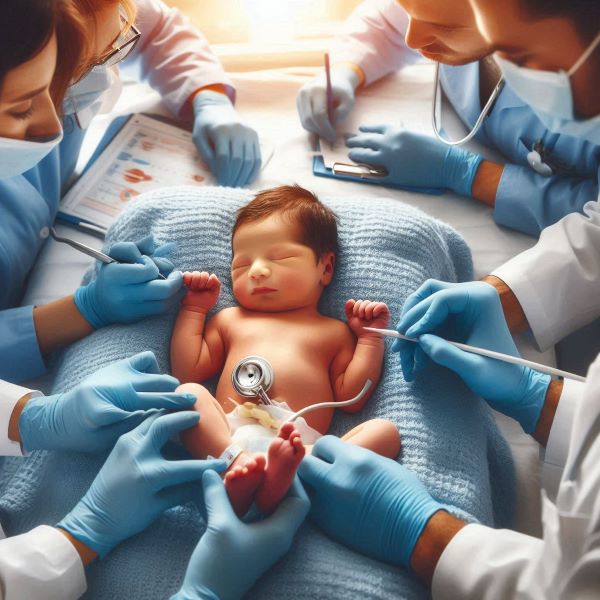The monsoon season brings relief from the summer heat, but it also introduces challenges, especially for newborns. The increased humidity, temperature fluctuations, and prevalence of infections can pose health risks to your little one. It’s crucial for new parents to be vigilant and take extra precautions to ensure their baby’s health and safety. Here are some essential monsoon care tips for newborns. (Source)
Also, read: Mental Health in Monsoon: Know How to Combat Seasonal Affective Disorder
Understanding the Risks
Newborns have delicate immune systems that make them more susceptible to infections and illnesses. During the monsoon, the risk of waterborne and airborne diseases increases, making it imperative to adopt preventive measures. (Source)
1. Maintaining Hygiene
Hygiene is paramount when it comes to newborn care, especially during the monsoon.
Tips:
- Handwashing: Ensure that everyone who handles the baby washes their hands thoroughly with soap and water.
- Sanitization: Regularly sanitize toys, feeding bottles, and other items the baby comes in contact with.
- Bathing: Give your baby a bath with lukewarm water daily or on alternate days to keep their skin clean and free from infections.
2. Ensuring a Clean Environment
A clean living environment can significantly reduce the risk of infections. (Source)
Tips:
- Ventilation: Keep the baby’s room well-ventilated to prevent mold and mildew growth.
- Cleaning: Regularly clean floors, furniture, and surfaces to remove dust and allergens.
- Avoid Crowded Places: Limit exposure to crowded places where the risk of contracting infections is higher.
3. Dressing Appropriately
Choosing the right clothing can help your baby stay comfortable and healthy during the monsoon.
Tips:
- Layering: Dress your baby in light, breathable layers that can be added or removed based on the temperature.
- Avoid Overheating: Ensure the baby doesn’t get too hot, which can lead to heat rashes and discomfort.
- Cotton Clothes: Opt for soft, cotton clothes that absorb sweat and keep the baby cool.
4. Feeding and Hydration
Proper nutrition and hydration are essential for your baby’s growth and immunity. (Source)
Tips:
- Breastfeeding: Continue breastfeeding, as it provides essential nutrients and antibodies to strengthen the baby’s immune system.
- Hydration: If the baby is formula-fed or has started on solids, ensure they are adequately hydrated.
- Sterilize Bottles: Always sterilize feeding bottles and utensils to prevent infections.
5. Preventing Mosquito Bites
Mosquitoes are more prevalent during the monsoon and can transmit diseases like dengue and malaria. (Source)
Tips:
- Mosquito Nets: Use mosquito nets around the baby’s crib or sleeping area.
- Repellents: Use baby-safe mosquito repellents and avoid applying directly on the baby’s skin.
- Eliminate Breeding Grounds: Ensure there is no stagnant water around your home where mosquitoes can breed.
6. Skin Care
Monsoon humidity can affect your baby’s skin, leading to rashes and infections.
Tips:
- Dry Skin Properly: After bathing, dry the baby’s skin properly, especially in the folds, to prevent fungal infections.
- Moisturize: Use a gentle, hypoallergenic moisturizer to keep the baby’s skin hydrated.
- Diaper Rash: Change diapers frequently and apply diaper rash cream to prevent rashes.
7. Vaccinations and Medical Check-ups
Keeping up with vaccinations and regular check-ups is crucial for your baby’s health.
Tips:
- Scheduled Vaccinations: Ensure your baby receives all vaccinations as per the schedule to protect against infections.
- Regular Check-ups: Visit the pediatrician regularly to monitor the baby’s growth and address any health concerns.
- Consult for Symptoms: Consult your pediatrician if the baby shows any signs of illness, such as fever, diarrhea, or persistent cough.
8. Maintaining Warmth
The monsoon can bring sudden temperature drops, making it essential to keep your baby warm.
Tips:
- Room Temperature: Maintain a comfortable room temperature using a heater or air conditioner as needed.
- Blankets: Use light blankets to keep the baby warm during sleep.
9. Handling Monsoon Illnesses
Despite precautions, your baby may still fall ill. Knowing how to handle common monsoon illnesses can make a significant difference. (Source)
Tips:
- Fever Management: Keep a digital thermometer handy and monitor the baby’s temperature. Use fever reducers as prescribed by the pediatrician.
- Diarrhea and Vomiting: Ensure the baby stays hydrated and consult a doctor for appropriate treatment.
- Cold and Cough: Use saline drops for nasal congestion and a humidifier to keep the air moist.
10. Parental Care
Caring for a newborn can be exhausting, especially during the monsoon. Ensure you also take care of your health to provide the best care for your baby.
Tips:
- Stay Healthy: Follow a healthy diet and get enough rest to maintain your immunity.
- Support System: Seek help from family and friends to manage stress and fatigue.
- Stay Informed: Stay updated with the latest health guidelines and recommendations from your pediatrician.
Also, watch web stories: What are the best methods to relieve stress?
FAQs
Q: Can I take my newborn outside during the monsoon? A: It’s best to avoid taking your newborn outside during heavy rains or to crowded places. If you need to go out, ensure the baby is well protected from the rain and mosquitoes.
Q: How often should I bathe my newborn during the monsoon? A: Bathe your newborn daily or on alternate days with lukewarm water to keep their skin clean and prevent infections.
Q: What should I do if my baby has a fever during the monsoon? A: Monitor the baby’s temperature with a digital thermometer. Consult your pediatrician for appropriate fever management and medications.
Q: How can I prevent diaper rash during the monsoon? A: Change diapers frequently, keep the diaper area dry, and apply a diaper rash cream to prevent rashes.
Q: Is it safe to use mosquito repellents for newborns? A: Use baby-safe mosquito repellents and avoid applying them directly on the baby’s skin. Use mosquito nets and eliminate stagnant water to prevent mosquito bites.





